The Way Out: ‘Recovery system of care’
The on-demand recovery-focused homeless initiative in San Francisco requires one thing: showing up.
BY JARED McKIERNAN
Over the last decade, overdose deaths have surged nationwide as highly potent synthetic substances like fentanyl continue to flood the illicit drug market. In San Francisco, the crisis has spiraled even more drastically.
In fact, last year, San Francisco’s opioid rate rose to more than double the national average. What’s more—the city recorded 806 drug overdose deaths, more than any other year on record. Nearly 80 percent of all overdose deaths in the city last year involved fentanyl, which is about 50 times stronger than heroin. The statistics reflect a grim state of affairs that experts had predicted for months.
Officials point to a combination of
pharmaceutical marketing, poverty, limited treatment options and underfunded behavioral health care programs. As the crisis has escalated, the city has doubled down on its efforts to promote Housing First and harm reduction policies.
It’s in that climate that Steve Adami stepped in as the executive director of The Salvation Army’s The Way Out program in May 2023. While he believes those strategies have their place within the complex network of treatment, he said it’s important to invest in other strategies as well.
“This is more than a housing issue,” Adami said. “It takes 10 days to get treatment.


Sunderland RV Safe Park offers ‘slice of heaven’
In Portland, Oregon, The Salvation Army aims to get RV dwellers into permanent housing.
BY KAREN GLEASON
“It was a slice of heaven when I moved here,” said Gary Main, who relocated his Outback RV to The Salvation Army Sunderland Safe Park in Portland, Oregon, about a month ago.
Main currently lives in the RV with
his dog. He said he was at his wit’s end after a period of parking his RV along the road.
“It's meant as a stepping stone to get you back on your feet and not be out on the road where you can't get two hours sleep a night because with every little noise you hear you think someone's doing something to your vehicle or robbing you,” he said. “It’s very draining.”
Sunderland opened in July 2023
‘Vital’ collaborations
Western Territory releases
2023 Anti-Human Trafficking impact report.
BY ALEXIS MARION
Since its inception, The Salvation Army has been at the forefront of the fight against human trafficking around the world, including in the Western U.S., where the organization served 183 trafficking survivors in 2023, according to its 2023 Territorial Human Trafficking Impact Report.
Globally, the International Labour Organization reported nearly 28 million people in forced labor situations in 2021.
In the Western U.S., The Sal-
vation Army’s efforts are supported by 13 anti-trafficking programs, bolstered by local and international partners. It’s through this collaboration, The Salvation Army can respond to provide aid in these often life-threatening situations.
“Collaboration is vital,” said Jacqui Larsson, Western Territorial Social Justice Ministries Director. “We can never presume that we can take care of everything by ourselves…just the fact that we have both Salvation Army and other community contacts, locally, nationally and also globally, is so important.”
One story started in
as a joint project of Multnomah County and the City of Portland under its Safe Rest Villages Program, with the goal of transitioning people from living on the streets to finding permanent housing. While The Salvation Army manages the park, referrals come through the Joint Office of Homeless Services. The park can accommodate adults aged 18 and up, and pets are allowed.

The Salvation Army 30840 Hawthorne Blvd., Rancho Palos Verdes, CA 90275 NON PROFIT US POSTAGE PAID PERMIT NO. 1831 LOS ANGELES, CA NEWS FROM THE SALVATION ARMY USA WEST • MAY/JUNE 2024 • VOL. 42, NO. 3 TELLING THE SALVATION ARMY STORY FOR 41 YEARS • 19 8 3 – 2024 INSIDE caringmagazine.org See more about the impact of The Salvation Army and how you can help Do Good today at STAFF SONGSTER BRIGADES GATHER IN TORONTO West joins "A Choral Convocation." PAGE 3 BOOTH HOME COMBATS SENIOR HOMELESSNESS Historic home given new purpose. PAGE 8 BELLINGHAM CORPS FOOD PANTRY EXPANDS Residents face food insecurity. PAGE 7 WHAT IS NATIONAL SALVATION ARMY WEEK? How it began and what it means. PAGE 15 'MORE FULL PICTURE' OF THE KINGDOM OF GOD Adaptive retreat held at Crestmont. PAGE 6
Santa
|PHOTO COURTESY THE WAY OUT
Steve Adami (l) hands an unhoused individual a card offering stabilization services and addiction treatment without a waiting period at the Harbor Light Center in San Francisco.
Members of The Salvation Army’s Americas and Caribbean Modern Slavery and Human Trafficking Zonal Council stand at Western Territorial Headquarters in Rancho Palos Verdes, California. “We work closely together in this fight against human trafficking,” Jacqui Larsson said. |PHOTO COURTESY JACQUI LARSSON THE WAY OUT PAGE 11 SAFE PARK PAGE 12 REPORT PAGE 11 LISTEN TO STEVE ADAMI share more about The Way Out on The Do Gooders Podcast Episode 180 State of Recovery: On The Way Out in San Francisco with Steve Adami. Find the episode in your favorite podcast player or at caringmagazine.org/dogooderspodcast.
Gary Main is a resident of The Salvation Army Sunderland Safe Park in Portland, Oregon. |PHOTO BY JESSICA ZIELINSKI
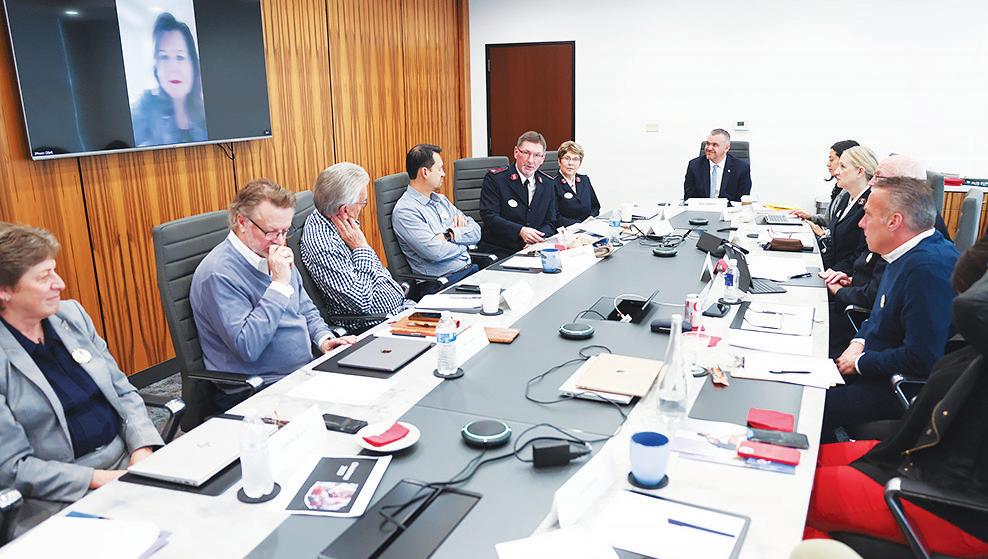
TERRITORIAL ADVISORY BOARD CONVENES
The Territorial Advisory Board (TAB) convened at Western Territorial Headquarters March 4-5. The gathering featured meetings and a seminar for cadets at the College for Officer Training at Crestmont. The seminar aimed to provide participants with insights into the National Standards of Excellence program and offer resources to help elevate their Advisory Organizations, which include Boards, Councils, Echelon chapters and Women’s Auxiliaries. “Through engaging panel sessions, attendees had the opportunity to ask questions and collaborate with others in the field,” said TAB Liaison Mariana Zumaya. “The seminar aimed to empower individuals with the knowledge and tools necessary for success, whether they attended in person or accessed the sessions remotely via livestream.” NFC

CHILE FIRE RELIEF
The Salvation Army deployed Emergency/Disaster Services (EDS) teams to Valparaiso, Chile, following wildfires that have damaged an estimated 15,000 homes.
What is your story?
The reason for the hope that you have?
Are you ready to share it?
Come to the Share Your Story workshop presented by New Frontier Publications Editor-in-Chief Christin Thieme at the 2024 Testify Congress and discover a simple formula to write your testimony with meaningful connection in mind. See more at events.usawest.org.

IHQ debuts online learning platform
Equip, the new online learning platform from International Headquarters, offers short, self-directed courses and instructor-led webinars to prepare officers, soldiers, staff, leaders and volunteers for mission. Course categories include: Faith and Community; Program and Project Development; People, Practices and Culture; and Global Specialization Sectors. Find it at salvationarmy.org/ihq/equip.
We read about miracles in the Bible, but I see God change people where it’s not possible. They’re too far gone. I’d look at them, and I’d say they’d never make it, but he makes it happen over and over again. Those are miracles.

Five Bible verses on the importance of community
Beloved, if God so loved us, we also ought to love one another.—1 JOHN 4:11
Iron sharpens iron, and one man sharpens another.
PROVERBS 27:17
For where two or three are gathered in my name, there am I among them. —MATTHEW 18:20
Finally, all of you, have unity of mind, sympathy, brotherly love, a tender heart, and a humble mind—1 PETER 3:8
And we urge you, brothers, admonish the idle, encourage the fainthearted, help the weak, be patient with them all.
—1 THESSALONIANS 5:14 1 2 3 4 5

Life is busy, but you can make an impact for good. Listen in to the Do Gooders Podcast, a show from The Salvation Army’s Caring Magazine for real-life inspiration, expert insight and ideas from change-makers so you can join in right where you are and be the reason somebody believes in goodness. Catch up on our Where Are We Now: The Current State of the Issues series starting with Episode 147. Subscribe today at caringmagazine.org/podcast
2 NEW FRONTIER CHRONICLE • MAY/JUNE 2024
UP FRONT “
—MAJOR MARK NELSON, ADULT REHABILITATION CENTERS COMMANDER, ON THE DO GOODERS PODCAST EPISODE 181 Listen to the interview in your favorite podcast player or find it at caringmagazine.org/podcast. Published by The Salvation Army USA Western Territory 30840 Hawthorne Blvd. Rancho Palos Verdes, CA 90275 General Information 562/436-7000 General Lyndon Buckingham, International Leader Commissioner Douglas Riley, Territorial Commander Colonel Eddie Vincent, Chief Secretary EDITORIAL STAFF Christin Thieme, Editor-in-Chief and Literary Secretary 562/491-8723 • christin.thieme@usw.salvationarmy.org Hillary Jackson, Managing Editor 562/491-8330 • hillary.jackson@usw.salvationarmy.org Karen Gleason, Senior Editor 562/491-8332 • karen.gleason@usw.salvationarmy.org Haley Osness, Editor 562/491-8345 • haley.osness@usw.salvationarmy.org ONLINE AND SOCIAL MEDIA Cory Gaudaur, Digital Operations Director 562/491-8326 • cory.gaudaur@usw.salvationarmy.org Emily Anderson, Social Media Editor 562/491-8793 • emily.anderson@usw.salvationarmy.org LAYOUT AND DESIGN Kevin Dobruck, Art Director 562/491-8328 • kevin.dobruck@usw.salvationarmy.org caringmagazine.org new.frontier@usw.salvationarmy.org newfrontierchronicle @nfchronicle New Frontier Chronicle founded 1983 Bob Docter, Founding Editor ISSN 2164-5930 • westernusa.salvationarmy.org FIND MORE WAYS THE SALVATION ARMY DOES GOOD AT CARINGMAGAZINE.ORG. Caring is a magazine from The Salvation Army for people who care about making an impact for good. As a Salvation Army officer or employee, you’ll also find a curated collection of inspiring news for you in the New Frontier Chronicle print edition and our email newsletter, the Weekly.
YOU
provide
group
DID
KNOW? The Salvation Army’s Community Care Ministries
MORE THAN 315,000 VISITS to people in hospitals, nursing homes and
homes.
Officers, staff and volunteers have removed rubble, provided cooked meals and offered emotional support to families affected. NFC
|PHOTO COURTESY EJÉRCITO DE SALVACIÓN CHILE
DO GOODERS PODCAST
|PHOTO BY JOHN DOCTER
West’s staff songsters join in historic choral weekend

er Barbara Allen. The Canadian Staff Band (CSB), under the leadership of Bandmaster John Lam, presented a prelude and offered their musical support to the event.
reminded those gathered of the goodness of the Lord and his everlasting mercy and truth.
Lt. Col. John Murray, Territorial Secretary for Communications and Executive Officer of the CSS, expressed words of welcome and prayed God’s blessing on all that would transpire. The congregation then stood to sing “Praise, My Soul, The King of Heaven,” arranged especially for the event by Captain Nicholas Samuel, Corps Officer at London Citadel, Ont., and a member of the CSB.
Throughout the event, the ISS presented a variety of selections, including “Ubi Caritas,” a traditional Latin antiphon with music by Ola Gjeilo, Sandi Patti’s “In the Name of the Lord” and Joseph Martin’s “You Are the Song.”
In turn, each of the supporting brigades took their place on the altar steps of the majestic Yorkminster Park Baptist Church to offer songs of praise to the Lord. Among their musical contributions were Shaun Craig’s “In Christ Alone” by the WTSS.
Heather Hetherington, daughter of the late General Arnold Brown, received a plaque recognizing his establishment of the ISS in 1980.
Gift of salvation
BY PAMELA RICHARDSON
The eyes of The Salvation Army world were on Toronto as six staff songster brigades came together for “A Choral Convocation.” The historic ministry weekend, held April 5-7, featured a celebratory meal, community performance and ministry opportunities for the choral groups.
The sounds of “A Choral Convocation” filled Yorkminster Park Baptist Church April 6. The weekend’s namesake event was also enjoyed via live stream by Salvationists and friends from dozens of countries around the world.
The International Staff Songsters, under the leadership of Dorothy Nancekievill, were the special guests for the weekend, and were finishing their North American “Songs of Love” tour. Supporting the ISS were the host Canadian Staff Songsters (CSS), with Songster Leader Cathie Koehnen, and the four staff songster brigades from across the United States, including the USA Western Territory Staff Songsters (WTSS), with Songster Lead-
The night before, the six songster brigades met for a celebration dinner and concert by the ISS. During the dinner, ISS member Ruth Unwin was recognized for her 44 years of faithful—and ongoing—service to the brigade. As a charter member of the ISS, Unwin has been singing with the group since its formation in 1980.
The dinner was also attended by Canada and Bermuda Territorial leaders Commissioners Lee and Debbie Graves and Colonels John and Lani Chamness, Chief Secretary and Territorial Secretary for Spiritual Life Development, respectively. Also present for the occasion were General Brian Peddle (Rtd), Commissioner Rosalie Peddle and General Linda Bond (Rtd).
Songs of praise
“A Choral Convocation” began with a presentation by the ISS of Benjamin Harlan’s “Make a Joyful Noise.” With words adapted from Psalm 100, the lively song

A highlight of the Choral Convocation was the presentation of the “Hallelujah Chorus” from Handel’s “Messiah” by the massed songsters and the CSB, under the leadership of Major Len Ballantine, former leader of both the ISS and CSS. Later in the program, the groups joined again to share Ballantine’s “Behold the Tabernacle of God,” based on the words of Revelation 21:3-4.
Following the ISS’ presentation of John Stainer’s “God So Loved the World,” Territorial Commander Commissioner Lee Graves shared a devotional message on the gift of salvation, which the Apostle Paul says is indescribable. “Paul would further make the statement that it’s a love that surpasses our knowledge,” he said, assuring his listeners that salvation is available to all.
As the evening concluded, the massed songsters joined in “The Lord Bless You and Keep You,” a familiar benediction from Numbers, with music from John Rutter.
Before sharing a closing prayer, Cathie Koehnen
Attending the UN’s Commission on the Status of Women
Delegate shares about listening to learn.
BY SADIE COWING
I found myself running down 44th Street in New York City with my Australian friend I had met just the day before. With our bagels in hand, we were nearly late to a meeting on feminist financing, and we still had two blocks to go.
they will commit to doing. Essentially, participants aim to work themselves out of a job by developing strategies to achieve global gender equality.
—Sadie Cowing “
HONESTLY, ENGAGING WITH OTHER ORGANIZATIONS WITH THE INTENTION OF ADVANCING JUSTICE EVERYWHERE FELT LIKE A RETURN TO THE VERY BEGINNINGS OF THE SALVATION ARMY.
I was attending the Commission on the Status of Women, a twoweek conference hosted by the UN March 11-22 that brings together governments, organizations and activists from all around the world. It is an annual event, dedicated solely to the advancement of gender equality globally.
Each year, a priority theme is chosen: this year’s theme was “accelerating the achievement of gender equality and the empowerment of all women and girls by addressing poverty and strengthening institutions and financing with a gender perspective.”
With the priority theme in mind, representatives from 45 member states come together and draft up a document outlining the work
As a 20-year-old acting major, I did not serve as the representative for the United States. Instead, I attended CSW68 as a girl advocate through The Salvation Army’s International Social Justice Girls’ Group. The group, which is comprised of young Salvationist women from territories all over the world, was created three years ago to foster conversations about global issues, and to take action to address them.
As a Girl Advocate, I wasn’t the one drafting up a grand statement document for the future of gender equality. In fact, while I was there, I only went inside the UN building twice...and one of those times was just to visit the gift shop. So what was I doing, other than spending the Western Territory’s budget on a New York bagel?
The way I saw it, my job was to listen.
I began each day with a devotion hosted by Ecumenical Women, a coalition of multiple Christian denominations affiliated with the UN. Over the course of four days, I attended 12 different parallel events, and took 25 pages of
Six staff songster brigades from across North America and the United Kingdom convene.
NEW FRONTIER CHRONICLE • MAY/JUNE 2024 3
|PHOTO
Above: Sadie Cowing takes a selfie in front of the United Nations with other delegates.
BY SADIE COWING
12
SONGSTERS PAGE
COMMISSION PAGE 7
The Western Territorial Staff Songsters perform at "A Choral Convocation" in Toronto. |PHOTO BY MARK YAN

Hospitality House helps empty nesters get back on their feet
BY DORIEAN STEVENSON
When Marco and Josephine Romero first entered the doors of The Salvation Army Hospitality House in Tucson, Arizona, 15 years ago, they needed a safe haven for their young family of five. They learned firsthand the benefits of working with The Salvation Army to find a place they could call their own.
But after their youngest went off to college in 2020, mounting bills, two knee replacement surgeries and an unstable living situation rendered the couple’s empty nest overwhelming. The Romeros were determined to rise above these setbacks on their own, and took drastic measures to do so.
“We lived in our vehicle for six months,” Marco Romero said. "That living situation proved to be a harrowing experience. At 6’4”, he found it hard to get comfortable enough to heal post-surgery. Josephine Romero’s identification and cell phone were stolen during a carjacking. “You find a lot of people who do not have good intentions,” he said.
One place they’d trusted before and knew they could rely on again is The Salvation Army Hospitality House. Contrary to some of the people they encountered while living in their vehicle, the Romeros met with Salvation Army employees and shelter residents who treated them like family. In fact, their caseworker, Mary Robles, is just about as close to family as it gets.
“I found out that they grew up not too far down the block from where my grandparents lived,” said Robles, who has been a caseworker at the Hospitality House for three years. “It was a nice reminder as to where my roots were because that’s where I started doing my community work.”
The Salvation Army Hospitality House in Tucson offers a number of services, including a 21-night stay, rental assistance, deposit assistance, starter kits to help people get settled in their new homes and more.
Working with Robles, the Romeros
Rain, shine or snow
Food box delivery drivers brave the elements in Central Alaska.
BY HILLARY JACKSON
Paul Bentley has been a part of The Salvation Army Mat-Su Valley (Alaska) Corps for 15 years. He said he tries to volunteer as much as he can with the food pantry, sometimes participating in deliveries to homebound seniors in the bush.
“This year was one of the bad years,” he said. “Lots of snow.”
Much of Alaska experienced extreme cold this winter, with temperatures well below zero in many parts of the state at the beginning of 2024. Anchorage experienced record snowfall in February, and the Matanuska-Susitna Valley (Mat-Su), located an hour away, also had an abundance of snow and high winds. This resulted in blizzards that blocked roads and limited travel.
Those conditions haven’t stopped the Mat-Su Valley Corps from continuing to deliver food boxes to those who call the 25,000 square-mile valley home, many of whom are homebound seniors living “off the grid,” said Corps Officer Major Tina Bottjen, noting that many are homebound due to fear of falling on ice and driving in the elements.
“Many older adults depend on The Salvation Army for their monthly food box, and we’re not going to let them down,” she added.
This means each Friday, Administrative Assistant Oliver Maea and volunteers like

Bentley load up a van with the food boxes for seniors, and then deliver them to each recipient’s house. Maea, a self proclaimed “wild child” because he “likes driving in the snow,” said sometimes the effort takes all day due to the size of the valley and the fact some recipients reside in remote locations.
“Doesn’t matter—rain or shine, or in our case, the snow,” he said. “We’ll do our best.”
And he means it. With this year’s wintry
weather, creativity is sometimes needed.
“We’ve had some places where we can't do any deliveries if it’s really bad, but we have taken food boxes on a sled to peoples houses in three feet of snow,” Bentley said.
Other times, it’s taken AWD vehicles and shovels to get to seniors’ doors. And dodging moose and other wildlife.
“Some of the people are in tears,” Maea
Restaurants serve up support, jobs for ARC grads
BY HALEY OSNESS
Situated in Santa Monica, California, Crimson Mediterranean Cookhouse and Society Kitchen restaurants provide dining experiences centered around vibrant cuisine and a warm atmosphere. But for a growing number of Salvation Army Santa Monica Adult Rehabilitation Center (ARC) graduates, the eateries serve an additional purpose.
"This was the first step to the rest of my life," said Samuel Valentine, Assistant Manager of Crimson Mediterranean Cookhouse.
Valentine graduated from the Santa Monica ARC in 2016, after having participated in the residential program for those who are experiencing a variety of social, emotional and spiritual challenges, including issues relating to substance abuse. He was the third graduate hired to work at the restaurant.
“The ARC gave me tools to succeed and maintain sobriety and this job helped me re-enter as a functioning member of society,” he said, noting he “started with nothing” when he joined the ARC, but now he can financially support his wife and two children.
“I’m just so grateful for the support,” he said.
Over the last eight years, the restaurants have served as a next step for about 15 men coming from the program.
“I wanted to do something new and better with my life,” Valentine said. “Ever since then, I've decided I'd love to see other guys from the program come and do the same.”
He’s one of five ARC graduates currently employed between the two Crimson Mediterranean Cookhouse establishments. He said the job has changed his life for the better.
After completing the six-month program, many participants, like Valentine, seek employment and opportunities to reinte-

grate into society. Valentine said he has been able to use his position to give others a second chance.
“It can be nerve-racking to switch up your whole way of living,” Valentine said. “When we hire guys from the program, we can help support them and they can continue to be around their brothers.”
Valentine works closely with owner Nicole Ghafourian and communicates with staff at the Santa Monica ARC when job openings arise. He said the communication goes both ways,
4 NEW FRONTIER CHRONICLE • MAY/JUNE 2024
DELIVERY PAGE 11
Volunteer Helen Maea prepares to make a delivery using a sled. |PHOTO COURTESY TINA BOTTJEN
EMPTY NESTERS PAGE 12
Josephine and Marco Romero |COURTESY JOSEPHINE AND MARCO ROMERO
RESTUARANTS PAGE 12
ARC graduates Samuel Valentine (left) and Spencer Waldrum (right) pose at Crimson Mediterranean Cookhouse. |PHOTO COURTESY TIMOTHY RODRIGUEZ
Mission trip inspires lifetime of service for three officers-in-training
Three Salvation Army cadets reveal how a mission trip to Greece set them on a path to serve.
BY KAREN GLEASON
“Having the heart for justice is, for me, really powerful,” Emily Reed said.
Reed participated in a 2019 social justice immersion trip to Athens, Greece, with a team that included her husband, Brian Reed, and Jordan Sargent. There, the group assisted The Salvation Army in its work with refugees and individuals who were unhoused or being prostituted.
The long-term goal of the trip? To return home committed to advancing biblical values of human dignity, equality, hope, compassion and community—The Salvation Army’s vision for social justice it’s held since its inception in Victorian England.
Now, five years later, the trio are cadets in the appropriately named Defenders of Justice Session, training to become Salvation Army officers, or pastors, at the College for Officer Training at Crestmont in Rancho Palos Verdes, California. After two years at the college, they expect to graduate and be commissioned in June as Salvation Army officers.

GOING TO GREECE WAS A POINT IN MY LIFE WHEN I WAS FINDING MY PURPOSE. THAT'S WHERE I FIRST FELT CALLED TO OFFICERSHIP.
Brian Reed said he had felt unequipped as the only man on that mission trip—he wondered what difference he could make for the women they served in Greece. He said he stayed in the background, cleaning and cooking meals for them.
—Jordan Sargent “
“I still reflect on the impact that not being in the spotlight of ministry, but being behind the scenes, actually had in those 10 days,” he said. “I didn’t even know I was being seen by those we were serving.”
On their last day in Greece, when one of the women finally approached him and said, “You clean good; you clean good,” he realized he had been seen all along.
“God used my heart,” Reed said. “And he equipped me…It’s about reaching people. It
doesn’t matter where it is or if you get acknowledged. I just want to serve anywhere.” Sargent felt a similar pull after participating in the immersion trip, something she said she still thinks about frequently. “Going to Greece was a point in my life when I was finding my purpose,” she said. “That’s where I first felt called to officership.”
When they returned to the U.S., the Reeds and Sargent became “Social Justice Sergeants” in their local Salvation Army corps (church). They were the first ones in the Western Territory and were tasked with making a difference in their communities.
In Tacoma, Washington, Emily Reed worked to combat human trafficking and Brian Reed fought for the rights of migrants and refugees. In Yakima, Washington, Sargent sought to raise awareness of human trafficking.
The Defenders of Justice Session will graduate and be commissioned, ordained and appointed at the 2024 Testify Congress June 14–16 in Pasadena, California. See more at events.usawest.org.
“When this [role] came onto our plate, we thought, ‘OK, God, we see the pattern of justice here,’” Brian Reed said. “Maybe this is the specific ministry that you’re calling us to.”
The Reeds and Sargent arrived at the Crestmont campus in 2022. Once mission trip team members, the trio had become good friends and ultimately, session mates.
Looking ahead, Emily Reed said she has a passion for marginalized communities, for those who feel unseen and excluded. As she worked with the refugees and the women who were being commercially sexually
‘BRING BACK THE FIRE’—SPRING CAMPAIGNS IN KENYA
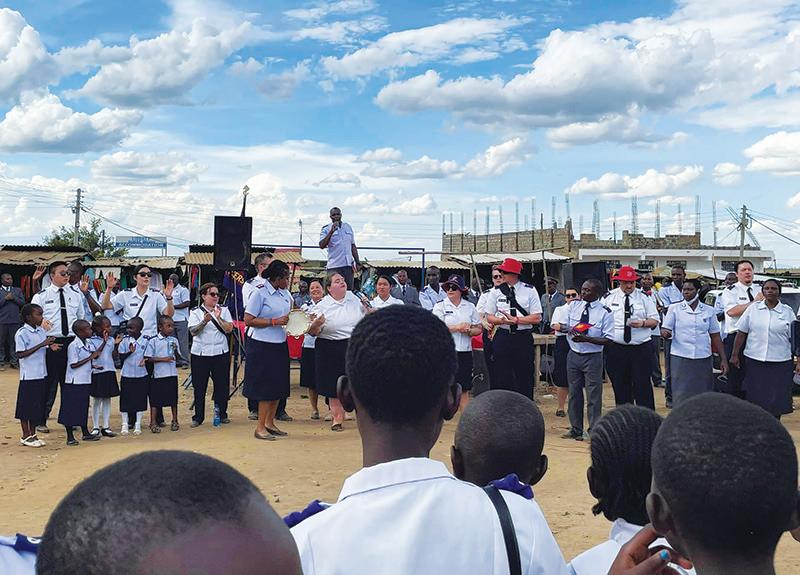
In March, the Saved to Serve cadet brigade from the College for Officer Training at Crestmont traveled to Kenya for Spring Campaigns. Second-year Cadet Faaoloviti (Nalo) Faasavalu reflects on the experience.
To say that our friends in the Kenya East Territory love the Lord would be an understatement. They live and breathe the blessings of Jesus Christ. This was evident in the way the cadets and officers at the Officers Training College praised and worshiped the Lord.
The passion and love that the people of Kenya have for God impacted me, as did the meth-
ods they use, including crusades and outreach ministries. The way they believe in the power of prayer deeply affected me.
From this Spring Campaign, I wish to bring back the fire they have for their love for God and the passion they have in their prayers. I plan to incorporate these in my future ministry and appointments. My hope is that I can express the love and passion for Christ and what he has done for our salvation to the people my wife and I will minister to.
Throughout our trip to Kenya, I was reminded that praising God shouldn’t be limited to how others perceive worship should be; but rather praising God should be with all my heart, thanking him for his love. NFC
NEW FRONTIER CHRONICLE • MAY/JUNE 2024 5
CADET FAAOLOVITI FAASAVALU
|PHOTO COURTESY JOY GROENLEER
Jordan Sargent and Emily and Brian Reed on a mission trip to Athens, Greece in 2019. |PHOTO COURTESY JORDAN SARGENT
PAGE 7
MISSION TRIP


Adaptive Retreat gives a 'more full picture' of the kingdom of God
BY HILLARY JACKSON
Inside the chapel on the Crestmont campus in Rancho Palos Verdes, California, colorful ribbons were waving, beach balls were flying and Jon Psaute was on stage signing “Friend of God” in American Sign Language as part of the worship band for The Salvation Army Western Territory’s second Adaptive Retreat.
Last year, Psaute spontaneously joined the band in this capacity. This year, Director of Disabilities and Ministries Major Nancy Helms invited him back as an official part of the band.
“God does major things around here,” he said.
This year, the Adaptive Retreat, held April 12-14, invited attendees to “Bloom Boldly,” creating space for worship and joy.
Helms said the weekend is a glimpse of seeing the kingdom of God the way she thinks God intended us to experience it, as members of the disability community represent an estimated 16 percent of the world’s population, according to the World Health Organization, making them the largest marginalized group. A group that is often, unfortunately, not included in the church, too.
IT'S JUST A BEAUTIFUL PICTURE OF WHAT THE BODY OF CHRIST SHOULD LOOK LIKE. WHEN YOU COME TO EVENTS LIKE THIS, THE BODY'S WAY MORE COMPLETE.
—Major Nancy Helms “
“This is a more full picture,” she said. “That excites me, because I think we all benefit from that—giving seats of honor to the people Jesus told us to, and I think God's honoring it. It's just a beautiful picture of what the body of Christ should look like. We're missing a lot of parts. When you come to events like this, the body's way more complete.”
This year 27 delegates came from around the West, and as far as Brooklyn, New York, and Canada. Major Pamela Maynor, Director of Mission and Ministry Training at the College for Officer Training in the Eastern Territory, was the guest speaker for the weekend.
“I think this community is so often not included in church services, not out of a want to exclude, but out of an ignorance of knowing how to include,” Maynor said. “The fact that there is something being birthed as beautiful as this that will just not only embrace this community, but in a way, welcome us into their community to learn from them…This is a taste of heaven.”
Over three sessions, Maynor spoke about being fearfully and wonderfully made, blooming with the body of Christ and sharing your beauty.
“Worship was so free,” she said. “There were no judgments, there were no thoughts of immaterial lit-
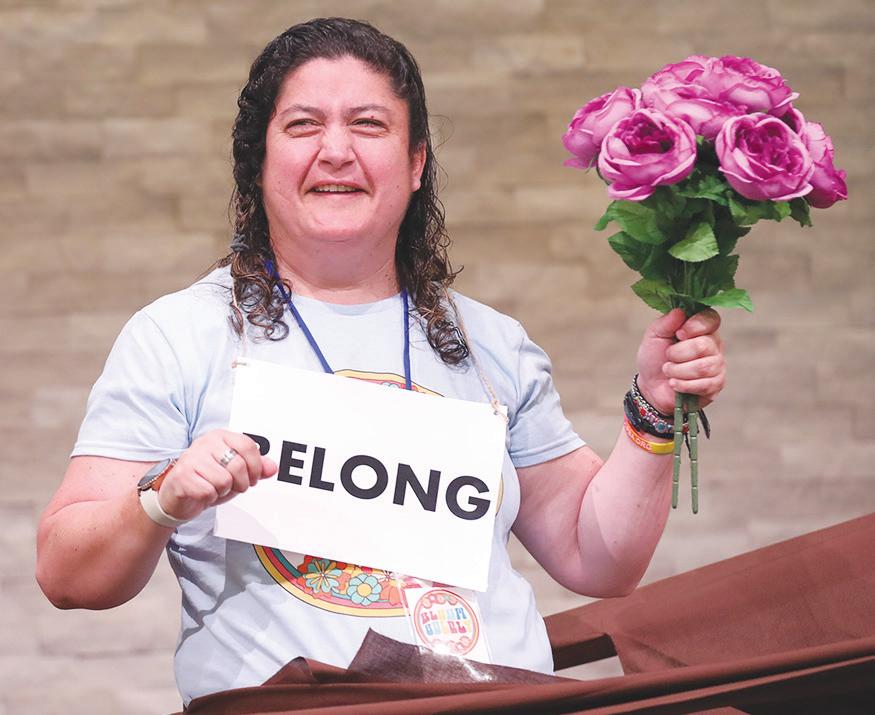
tle things that typically would be on your mind…It's just worship. The priority is the priority. It's been such a gift, such a blessing.”
In addition to the main sessions, attendees participated in activities, like choir, karaoke and movie nights and shared meals.
At Saturday’s Field Day, there were opportunities for delegates and their caregivers to have fun and give back. Harrison Armstrong’s favorite part?
“Helping the people in the shelters out with giving them socks and some water,” he said from the blessing bag station. The bags will be distributed through the Stillman Sawyer Center in Harbor City, California.
Next to the blessing bag station were areas to decorate cookies and paint rocks. In the lawn, areas dedicated to bubbles, yard games, inflatable play and face painting brought smiles.
Heather Rew, from Yakima, Washington, chose to have a purple butterfly painted on her wrist. For Rew, the trip to the retreat marked her first time on
an airplane, and in California. Her thoughts on the retreat? “I love it,” she said.
Throughout the weekend care was given to create spaces to accommodate a range of needs for the delegates, like adding ear plugs to the back of the chapel and creating a lower-stimulation area in the Terrace Room where meals were served. Additionally, time was dedicated for caregivers to connect.
Every caregiver’s experience is different, said Gerriann Armstrong, noting she’s attended the retreat with her son both years.
“The best part is seeing the growth, and then the connection—the pieces of finding your people… People who understand about the things that we cry about in public or in private about, hopes and dreams and the changes of those things,” she said.
“It's a new group of people that you're able to connect with and are like, ‘OK, I'm not the only one.’”
6 NEW FRONTIER CHRONICLE • MAY/JUNE 2024
ADAPTIVE RETREAT PAGE 11
Delegates to the Western Territory's second Adaptive Retreat take part in worship (top left), enjoy outdoor activities (top right) and participate in teaching exercises (above). |PHOTOS BY JOHN DOCTER
Bellingham food pantry expands
BY HALEY OSNESS
When an Albertsons grocery store in the Birchwood neighborhood of Bellingham, Washington, closed in 2016, residents found themselves in a food desert with limited access to fresh vegetables, meat and dairy products.
Today, the challenge of accessing groceries persists in the Bellingham neighborhood, located 21 miles south of the U.S.-Canadian border. The nearest grocery store is more than a 20-minute walk away for most residents.
In response to the food insecurity affecting some 30,000 residents in Bellingham, The Salvation Army Bellingham Corps food pantry underwent renovation and switched to a grocery-store model that opened on March 11. The transition and expansion will now provide an array of fresh groceries with more options to support dietary and cultural needs.
On Tuesdays and Thursdays, clients can walk down the aisles of the food pantry with a shopping cart and personally select food items, hygiene products and pet food. Additionally, clients will receive complimentary recipe cards featuring meal ideas using the available food items.
"Giving clients the chance to select what they need empowers them and provides an opportunity for connection so we can better understand their needs," said Elizabeth Hicks, Bellingham Corps Social Services Director.
Hicks said that engaging with residents at the facility enables them to build relationships with the local community and provide additional services when needed.
“By ensuring locals are fed first, we can move onto addressing other needs like housing or financial assistance,” she said.
The renovation includes new training rooms and offices, facilitating the operation of The Salvation Army social services program, Pathway of Hope, at the food pantry.
Once a Salvation Army Thrift Store, the expanded location and training rooms will hold classes on healthy eating and financial literacy while serving as a meeting space for community partners and collaborations.
According to Major Shevaun Malone, Bellingham Corps Officer, adding classes and Pathway of Hope services can help set residents up for long-term stability.
“We will begin networking and facilitating relationships with community members and stakeholders to really boost the possibilities of the food pantry with classes,” Malone said. “It’s a powerful thing to be able to help people in this way.”
The food pantry has served an average of 3,500 families a month over the past three years, reflecting a nationwide concern surrounding food insecurity. According to Feeding America's 2023 annual report, in 2022
COMMISSION FROM PAGE 3
notes. Each meeting was put on by a different non-governmental organization, and focused on a different issue facing women around the globe.
I was able to hear experts in womens’ advocacy share real struggles women face, and the steps that must be taken to address them. The Salvation Army has a presence in nearly every area discussed in the events I attended. Learning about all of these different issues was simultaneously humbling, enraging, overwhelming and inspiring.
One of the events I attended was on the way that gender biases are being encoded into AI programs. Essentially, there are eight main data sets that are treated as benchmarks, used to help most AI systems to learn. All of these data sets are from the global north, and they treat a white, able-bodied man as the human standard.
This has huge implications for human rights, because these AI systems are not being checked for discrimination before being put into use.
Technology develops quickly, but policy develops slowly, resulting in great injustice for women and all their intersections. I found this event particularly fasci-

alone, 49 million people in the United States sought food assistance for additional support.
“A large percentage of our clients are low-income," Hicks said. "That, combined with rising food costs and transportation concerns, creates a major need for our food pantry. People know they can come here for a healthy meal and don’t need to choose between buying groceries or paying bills.”
Just one day after the renovated pantry opened, Hicks stated that they served 300 families within four hours, marking a 40 percent increase compared to the number of families served during the COVID-19 pandemic.
“It’s essentially a small-scale grocery store that so many locals can now rely on,” said Lt. Col. Cindy Foley, Divisional Commander of The Salvation Army Northwest Division. “If clients don’t have access to a full kitchen, there are frozen and ready-made meals that they can enjoy almost instantly.”
Foley said that the renovation coincides with The Salvation Army's commitment to transitioning all Salvation Army food pantries in the Northwest Division to the client-choice model.
“Client-choice provides a unique level of care that goes beyond handing someone a food box,” Foley said. “By having our clients walk alongside staff there’s
nating because it was one of the only issues that The Salvation Army isn’t currently heavily involved in.
If the Army were to unknowingly utilize AI that learned from biased data, we run the risk of perpetuating the problem by taking actions based on that biased data. By getting involved in this conversation now, we can better love and serve our neighbors through advocating for them in this new digital space.
My time at CSW68 opened my eyes to just how much the Army is involved with the UN. The Salvation Army’s International Social Justice Commission building was one of only three spaces that hosted countless parallel events. Honestly, engaging with other organizations with the intention of advancing justice everywhere felt like a return to the very beginnings of The Salvation Army.
I left New York ready to return to my local corps, feeling inspired to serve my community more holistically. It is my prayer that The Salvation Army will encourage more of its soldiers and officers to attend CSW and comparable conferences in the future. By inspiring more soldiers and officers to create change in their local communities, we can advance our mission of meeting human needs in God’s name without discrimination. I am so excited to be a part of this work. NFC
a chance for longer conversations where we can learn if someone lost their job or is facing extreme medical bills.”
According to Foley, the store will be stocked with donations and surplus food from local restaurants, creating the added benefit of reducing local food waste.
"We partner with local growers for fresh produce," Foley said. "We will also receive fresh, unopened meals that didn't sell from restaurants such as Olive Garden, Starbucks, Chipotle, or rotisserie chickens from Walmart."
The client-choice model will also reduce waste directly, as clients select only what they need.
“With the standard food box method, clients will take a pre-picked food box because they need it,” Hicks said. “But we’ve learned that some clients end up with items they don’t like or can’t eat.”
Hicks recalled a client who admitted that she had felt too embarrassed in the past to share her inability to consume certain items provided to her. However, she now expresses gratitude for the new model, as it has brought a sense of independence.
“It’s really just a great way to support the community,” Hicks said. “The method reduces shame and brings a level of self-sufficiency that can break the stigma of visiting a food bank.” NFC
MISSION TRIP
FROM PAGE 5
exploited in Greece, she realized many didn’t know how to get the support they needed.
Today, her passion is for another often excluded group—the disabilities community. As an officer, her goal is to ensure they’re included in the church.
“That’s a social justice issue in itself,” she said. “And I feel like I wouldn’t have been open to this if it wasn’t for the trip—being immersed in the programs, sitting with the women who were working the red light district and hearing refugee stories.”
Despite his uncertainty on that mission trip, Brian Reed said he accepted the opportunity and showed up with what he had, and God used him—something he expects will translate to full-time ministry.
“When I think of officership, I think of giving others that opportunity,” he said. “I can be the corps officer, but I can only get so far in my impact of what we can do in the community as The Salvation Army. But if I can give others in my congregation an opportunity to be equipped and to exercise their gifts, then we as a whole Salvation Army can make a larger impact.” NFC
NEW FRONTIER CHRONICLE • MAY/JUNE 2024 7
Northwest Divisional Commander Lt. Colonel Cindy Foley speaks at the opening of the expanded Salvation Army food pantry in Belllingham, Washington. |PHOTO COURTESY BELLINGHAM CORPS
IThe Glendale (California) Corps partners with the Department of Mental Health to support seniors with interim housing.
BY KAREN GLEASON PHOTOS BY JOHN DOCTER
t was early, before 9 a.m., when I arrived at the picture-perfect Victorian house in Glendale, California. A man was sweeping the sidewalk outside the entrance. I wondered, who is this? Am I in the right place?
It was Ambrosio Lozano, a guest at the Glendale Salvation Army Booth Home—exactly the place I had come to see. For Lozano, 75, the Booth Home is home and he treats it as such. He’s lived there for two and a half years.
“When you see a clean place, it feels good,” he said. “But not if you see it’s all messy with papers and leaves.”
Cleaning is one way Lozano gives back to Booth Home, which provides interim housing for 15 unhoused seniors—men and women—while they work with case managers to secure permanent housing.
Glendale Corps Officer Captain Kelly Berggren said most guests find permanent housing after nine months to a year. Sometimes the process takes longer, as it is for Lozano, because of the lack of affordable housing. Fortunately for these guests, the Booth Home doesn’t limit how long someone can stay.
Clients come to Booth Home through the Los Angeles Department of Mental Health and its interim housing program (IHP). In the past, the house sheltered single mothers and was the first shelter for families experiencing homelessness in the city.
In 2019, when Berggren and his wife, Natalia, came to the corps, the Department of Mental Health approached them about housing seniors. Berggren said the department had recognized a growing need for
BOOTH HOME’S

housing seniors and was willing to partner with them and provide funding. The transition took place.
Since then, Booth Home has stayed full. When there’s a vacancy, the IHP refers clients, who must be 60 or older with a mental health diagnosis. Berggren said the seniors often have depression and many have difficulty coping with their emotions.
“A lot of these people come to us and they’ve been living on the street or in their cars,” he said. “But they’ve all got a personality. Everybody’s got their own story. There is certainly no specific reason why people end up homeless.”
Lozano’s story centers around his adult son, who he said had alcoholism and was experiencing homelessness along the Los Angeles River. Concerned for his son’s safety, he joined him, looking to protect him. When Lozano became seriously ill, paramedics transported him to the hospital. Eventually, his path led to Booth Home.
“Number one, it’s better than being on the street,” Lozano said. “Here they give me a chance to have a shower, a room, a place to sleep. And I feel like after almost dying, I can be helpful. I want to help. I have to do something.”
Lozano helps with house cleaning, which takes place three times a day. He gets up at 4:30 a.m. to be ready for the first cleaning at 5 a.m. He also maintains the outside landscaping and grows vegetables and flowering plants in the backyard.
It’s not just the curb appeal he cares about, though. It’s the people.
“When they come, they look very depressed,” he said. “I’m always playing around, singing, saying,
‘Come on—do this, do that,’ trying to let them know life is beautiful… From the time you put one foot inside the door here, we are family.”
For the Booth Home family, the home, built in 1896, boasts a TV room and the backyard garden. Each day, a continental breakfast is served along with hot meals for lunch and dinner, provided by the Glendale Corps kitchen.
Guests share a bedroom, two per room, with women on the first floor and men on the second. Staff members are on-site 24/7, and many of them attend the Glendale Corps and transport guests to the corps for church and other activities.
And the guests have the freedom to come and go—Berggren said many of them have vehicles. They can go about their activities during the day and evening, as long as they respect the 10 p.m. curfew. Since Booth Home is a sober residence, when someone is asked to leave, Berggren it’s usually for bringing alcohol or drugs on the property.
“Some of the clients do pretty well going out in the community,” Berggren said. “Some people don’t really like to leave Booth Home. It’s their comfort place.”
While Lozano is comfortable at Booth Home, he goes out into the community. After doing his daily exercises in the morning, he walks to a nearby 7-11 for a newspaper and then buys fruit at the 99 Cents Only Store. He returns to help out wherever he’s needed.
Although he’s looking for permanent housing, he said he’s content. “I believe that you make your own happiness,” he said. “Don’t worry about the past; don’t worry about the future. Live today.”
Berggren said he can appreciate the struggles the seniors face, as he’s getting closer to their age.
“One great thing is that we are able to house about 70 percent of those who come to us,” he said. “There’s a lot of money being put into mental health right now, and a lot of places going up to house people. That’s the good part about what we're doing here—there’s a light at the end of the tunnel for the clients that we serve.” NFC
8 NEW FRONTIER CHRONICLE • MAY/JUNE 2024
“
I BELIEVE THAT YOU MAKE YOUR OWN HAPPINESS. DON’T WORRY ABOUT THE PAST; DON’T WORRY ABOUT THE FUTURE. LIVE TODAY.
—Ambrosio Lozano




NEW FRONTIER CHRONICLE • MAY/JUNE 2024 9

Aurora Corps internship builds youth skill development
Regis Jesuit high school students in Aurora, Colorado, dedicate their time to the community.
BY HALEY OSNESS
Eight students from Regis Jesuit High School in Aurora, Colorado, dedicated 60 hours of volunteer work with The Salvation Army Aurora Corps. The goal? To boost community engagement and equip young individuals with skills for their future.
The students, referred to as interns, served in January as part of a school requirement for juniors and seniors to complete a two-week volunteer project of their choice while pausing traditional classroom schooling.
Students chose The Salvation Army from a collection of community organizations and nonprofits that work with underrepresented communities.
Once Aurora Colorado Corps officers Lieutenants Carl and Melissa Esquivel learned of the school program in 2021, they were eager to invite students to collaborate.
"We're very passionate toward youth leadership development," said Lt. Carl Esquivel. "I heard about the program, made a connection at Regis Jesuit and now we've been able to mentor students."
The students’ engagement with The Salvation Army has expanded each year, with Esquivel noting the corps had double the number of interns over the previous year— which helps the corps help the community.
According to Esquivel, the Aurora Corps serves roughly 34,000 individuals annually, providing a range of services that facilitate valuable learning experiences for the students.
"They're engaged in real work and gain practical experience in clerical duties, hospitality and intake processing with our social services," said Esquivel. "They're very much involved."
During the internship, students received task-specific training from department leaders. They assisted with food preparation, pantry organization and client assistance at the front desk, among other tasks. Additionally, they supported visitors in completing paperwork for utility and mortgage assistance.
Esquivel also took interns to community gatherings to teach them the importance of community partnerships. They attended a local Rotary Club gathering and even met with the mayor of Aurora.
“Everything we involve them with is to create a lasting impact,” said Esquivel.
Volunteering a ‘feel-good’ activity for Oregon senior

Research shows volunteering has myriad benefits for older adults.
BY CARAMIE PETROWSKY
When Byron Miller, 78, first came to The Salvation Army HOPE Center in Hillsboro, Oregon, he was in crisis mode. A clever scammer had convinced him to send three $500 gift cards in the mail, leaving him in a very precarious financial situation.
“They called me on the phone, and they had all the facts and convinced me to send them money,” he said. “Then I couldn’t pay my rent that month.”
Emotional and hurt, Miller was terrified of losing his home, located across the street from the HOPE Center. Adam Harvey, Washington County Programs Director, remembers how panicked Miller was when he first came to the HOPE Center.
“He had been deceived and robbed of money he couldn’t afford to lose and was facing eviction and sleeping on the streets,” Harvey said.
As such, Miller was laser-focused on finding help. Thanks to generous donors, the HOPE Center paid Miller’s rent and later, even helped fix his car and transport him to medical appointments.
Soon after receiving help, Miller decided to start volunteering in the food pantry to “pay it forward.”
He’s now a daily fixture at the HOPE Center, arriving before the pantry even opens. In the afternoons, he helps supply boxes for the food pantry, tapes them up after they are packed and carries them out to people’s cars.
“It makes me feel good to give,” he said.
Research has long shown that volunteering brings a cascade of positive effects. It gives people a sense of purpose and is even linked with better brain function. Recent research, presented at the Alzheimer’s Association International Conference in Amsterdam in 2023, shows volunteering is linked with better scores on cognitive function tests regardless of race, age, sex, education or income.
The study also showed the more a person volunteered, the better their executive function scores. Volunteering can also help combat depression and loneliness, helping to stave off mental health issues and even decrease one’s risk of dementia, according to a study done by the National Institute of Health.
Volunteering each day has given Miller a sense of purpose and connection he lacked before.
Following a challenging childhood, Miller experienced two divorces. Living alone, he said he spent
most of his time watching television or playing games on his computer. Miller said his time at The Salvation Army is helping him let go of some of the long-held hurt he carries and find gratitude.
“I’ve had a lot of different bad experiences in my life that I can forgive more after being here,” he said. “I’m happy where I’m at. I can go on with the rest of my life. God has given me the grace to continue. He gave his only son for us, and I thank him for that.”
Harvey and other staff members have watched Miller change during the last few months.
“Over time we began to notice a softening of his countenance,” Harvey said. “We began to see Byron engage with the clients of the HOPE Center with genuine care, we heard him laugh and engage more. He was truly opening up and experiencing life that his life of isolation had not provided."
“This serving opportunity had brought him back to friendships, back to relational connection, back to society. I believe God has used these new connections in his life to bring healing, purpose and warmth where, before, there was only loneliness.”
Miller is far from the only volunteer at The Salvation Army benefiting by giving back, according to Stacy Dertien, the Territorial Director of the Emergency/Disaster Services Volunteers and Training program for The Salvation Army’s Western Territory. It’s something she sees and hears about often in her role.
“Volunteerism is a feel-good activity that provides both a sense of purpose and sense of community, which are often key for the overall well-being of our senior community,” she said. “It's not only a way to give back, but also a way to socialize with like-minded people and work toward a common good.”
Volunteering doesn’t just help seniors like Miller, but in turn, the volunteers are very important to The Salvation Army’s success, Dertien said.
“Senior volunteers come to The Salvation Army with a wealth of knowledge that can benefit The Salvation Army on many levels,” she said. “A senior's big picture view of the world and life experience can provide unique wisdom and insights, and many retirees are open to sharing the knowledge, skills and expertise of their former careers which allows us to tap into skill sets that we may not otherwise be able to afford.”
It's critical to offer skill-based volunteer opportunities to effectively engage seniors, she said. “Most seniors will tell you that they have the time and are willing to help if there is an opportunity for them to use their skill set to make an impact.” NFC
10 NEW FRONTIER CHRONICLE • MAY/JUNE 2024
High school seniors Cole Oliver (back) and Alan Eiseman (front) prepare dog food at The Salvation Army Aurora (Colorado) Corps food pantry. |PHOTO COURTESY AURORA CORPS
Volunteer Byron Miller, 78, gives back after receiving help from The Salvation Army HOPE Center in Hillsboro, Oregon.
AURORA PAGE 13
|PHOTO COURTESY CASCADE DIVISION
THE WAY OUT
FROM PAGE 1
It’s easier to get dope than it is to get treatment.”
That’s where The Way Out comes in. It’s an on-demand recovery-focused homeless initiative. People can enter the program six days a week, with plans for seven-day access soon. They receive stabilization services and addiction treatment right away at The Salvation Army Harbor Light Center. The process begins with detox, followed by six months of residential care based on proven methods, which is phase two.
After completing treatment, participants can move to the Joseph McFee Center, The Salvation Army’s supportive transitional housing program and the third and final phase in the model. They can secure housing for up to two years, all while receiving on-site services such as case management, career development and help reuniting with family members.
“When we started, we redefined the initiative as not a building or a program but a recovery system of care to address the drivers of housing insecurity, which are behavioral health coupled with economic disadvantage,” Adami said.
Adami has a personal history with addiction. He cycled in and out of jails and prison for over two decades. During his time behind bars, Adami successfully got clean. Once he was released, he earned a master's degree in public administration with a focus on public policy and criminal justice. His journey led him to serve as the reentry division director at the San Francisco Adult Probation Department (SFAPD). He’s designed and implemented more than 60 reentry programs that are operational today.
With The Way Out, it was important to
FROM PAGE 1
Adami that The Salvation Army “de-bureaucratize” the treatment process as much as possible. After all, gaining access to city-operated detox and treatment programs often means navigating a complex process with frustratingly long wait times. Individuals seeking assistance typically undergo an assessment and referral procedure that can drag out over several weeks. Unfortunately, during this waiting period, many individuals abandon their pursuit of help.
“Our goal is to remove all barriers to get people into treatment,” he said. “All they have to do is show up. We take care of the paperwork once they’re inside. We do their assessment inside. We connect them to methadone, mental health beds—whatever they need.”
Joshua Brathwaite, a San Francisco native, is among those who showed up at The Salvation Army. He entered the program on a court order after an incident in Concord, California, in 2018.
“I was drinking and I thought it would be a good idea to get behind the wheel in broad daylight and take some Xanax,” Brathwaite said.
That’s when a firearm was discharged out of the vehicle. Brathwaite avoided prison time for the incident. His friend, who was riding shotgun, landed in prison for three years.
“That was the wake up-call,” he said. “That wasn’t even luck. That was a message from a higher power saying I needed to get my [stuff] together, real fast. I didn’t want his time in prison to be in vain, so I got clean.”
Brathwaite graduated from the sixmonth Harbor Light program in July 2023, and subsequently moved into the Joseph McFee Center to continue his recovery. Since then, he’s completed a culinary job training program and
Clarita, California, where the Santa Clarita Corps had a visit from a concerned mother who explained her daughter, Amy*, was being held by traffickers in Mexico. Larsson said she received the call on the situation from Santa Clarita Corps Officer Captain Rafael Viana and reached out to The Salvation Army’s Caribbean and North American Zonal Coordinator and contacts in Mexico to begin Amy’s return to safety.
“We were able to work with Amy’s parents to book flights to Mexico,” Larsson said. “The people in Mexico were able to set up an appointment with the embassy to obtain an emergency passport as the trafficker had stolen her identification, and we then set up secret meeting points where she could escape to and be met by the local corps officer.”
With prayer and coordination the team was able to get Amy and her family home safely. However, this process did not come without challenges.
“The two main challenges we faced initially were the language barrier and funding; we needed to fly the mother down to Mexico at the last minute, so booking a flight for the next day down to Mexico was challenging,” Larsson said.
Larsson explained that federal funding has been reduced for anti-trafficking organizations, making it difficult to gather the finances needed for situations like Amy’s. Even once Larsson’s team secured the funding, there were still difficulties in getting Amy back to the States.
“The trafficker had taken her phone, so she was unable to communicate with us. He had also taken identification, which is a really common issue in trafficking situations. So being able to put her on a flight was definitely challenging,” Larsson said.
When she made it back to the States, Amy was welcomed into The Salvation Army Orange County (Cal-
joined the staff at Harbor Light as a program assistant. He’s even started volunteering with the onsite food pantry, and crashed The Way Out’s softball team.
“I’m making sure my whole day is filled with something productive and there’s not too much idle time for me to get into my head and my feelings,” he said. “Hopefully, I get to help someone now who was in the same position I was.”
A few months ago, Brathwaite’s friend contacted him after getting released.
“I always felt guilty that I didn’t go to prison and he did. I used to lose sleep over it. But when I talked to him he said because of my recovery, and me being in the program at The Salvation Army, he just said, ‘Just keep doing what you’re doing,’” Brathwaite said. “That was such a weight lifted. It made me appreciate my life more and what I have going for myself now. It reminded me that I’ve seen the dark side, and I don’t want to go back to that side.”
The Salvation Army is hoping to prove the merit of The Way Out model with more
success stories like Brathwaite. In which case, The Way Out’s three-phase model has the potential to play a more significant role in the city's response to the addiction crisis. The program is already garnering wide-ranging support.
Garry Tan, venture capitalist and CEO of Y Combinator, said The Way Out is one of the city’s most important programs. “It opens the path to drug treatment, recovery and a human flourishing that breaks the cycle of addiction and abuse that has taken hold of the most beautiful city in the world,” Tan said.
Marc Benioff’s Salesforce donated an initial $1 million to the program. And Daniel Lurie, a mayoral candidate for San Francisco, has publicly voiced his support.
"We don't discriminate at The Way Out," Adami said. “We want people to have their lives back. Part of that is being accountable for your actions. But people can overcome addiction. We have thousands of people who have reclaimed their lives, who are contributing members of the community.” NFC
ADAPTIVE RETREAT
Armstrong said it’s time to consider what’s next. With many delegates having aged or aging out of activities designed for those under 18, what exists for them?
“There's this group of 18 to 35 year olds that we need to be looking at,” she said. “Where do they fit within our corps? Where do they fit within our organization, within our churches? What can we do to make sure that they have meaning for the things that they're doing? And that we're promoting that inclusivity in our community?”
Helms said many people have mis-
ifornia) Anti-Trafficking Services Safe House, where she received wraparound services and trauma-informed care.
Larsson said through The Salvation Army, she is looking to increase training and encourage others to grow in trauma-informed care.
“I’m always trying to share with the field that trafficking is happening in our communities and a lot of people just aren't aware that this is the case,” Larsson said. “Training our officers, employees, volunteers and the people in our programs is essential, not only so they know what trafficking is but also have an understanding of the signs that we should be looking out for, and how we should respond appropriately.”
Last year, The Salvation Army Western Territory trained nearly 2,500 individuals, according to the impact report. Additionally, The Salvation Army Western Territory reached nearly 5,000 people across 139 awareness, prevention and outreach events.
Preparation, like the kind Larsson is referring to, is critical in providing aid to those affected by and in the midst of human trafficking situations. Viana, who responded in Amy’s case, said another important key to The Salvation Army’s anti-trafficking efforts is having as many prepared people involved as possible.
“The more corps we have prepared to identify and welcome trafficked survivors and their families, the more impact we will have in the lives of those affected by such evil acts,” he said. “Such preparation is also fundamental for the prevention and quick action to assist those who are at risk of being taken.”
He said that although these situations come with many unique challenges, compassion and recovery is essential.
“Empathy…as well as acknowledgment of their strength in having survived is fundamental in order to consistently engage with them when they can't see the light at the end of the tunnel,” Viana said. NFC
*Name changed for privacy
FROM PAGE 6
conceptions about having a disability ministry.
“We think a disability ministry is this hard, impossible thing. But as you can see from this, it's simple. It's not simple in a simplistic way, but it's not hard to do.
“Even though there's people here with probably 20 different disabilities, everybody has a place at the table,” Helms said. “It's not hard, and they all worship in their own way, and it's beautiful. And I like that—we're so perfect about our worship and make it sterile, and they get up there and wave their ribbons, which I think is what God wants.” NFC
DELIVERY FROM PAGE 4
said. “They were not expecting to get their food because of how crazy the weather is, then they see us knock on their door.”
Consistency with the deliveries is something the corps strives for, Bottjen said, adding sometimes the elements are such that it becomes unsafe to venture out, like in blizzards.
“There have been times we have had to reschedule because of the weather…They’ll reschedule for the next day,” she said, noting the importance of the meals to the recipients. “It’s definitely a blessing for them and they definitely miss it.”
Inside the box are items such as cereal, shelf-stable milk, cheese, meat, bread, produce, juice, pasta, rice, canned fruit and fresh vegetables. Bottjen said due to having smaller appetites, many seniors are able to make it through the month with the items.
Maea said the team makes about 30 deliveries to homes three times a month with another distribution held in house at the corps building. The food deliveries are broken into three sections to ensure coverage of the valley: Palmer, Sutton and Wasilla.
A bonus? The crews will also shovel seniors’ walkways and driveways, if needed.
“A lot of times with them being an elder, they have difficulty shoveling,” Bottjen said. “They’re usually on social security or they’re on a fixed income, so they're not able to afford to have someone come and clear their driveways.”
She added that plowed sidewalks make it possible for others, like medical professionals, to get through—especially in emergency situations.
“The food pantry doesn’t shut down when the weather is bad,” Bentley said. “The only time we shut down is if it’s really, really bad weather and we can’t get out. We’re here to help the people.” NFC
NEW FRONTIER CHRONICLE • MAY/JUNE 2024 11
REPORT

SAFE PARK FROM
PAGE 1
“The idea for us would be that people would have a safe place to park without fear of the barriers of theft, of having to be very vigilant and stay in their RV all the time,” Sunderland Site Manager Philip Emery said. “When they're out on the street, they're not able to go and seek case management or access services. If you spend time here, you hear people say, ‘Well, here I feel safe because there's a gate.’”
The gated park can hold 55 RVs of varying sizes and accommodate up to 110 people. It boasts six full bathrooms with showers, a clothing closet and a laundry room. A hot meal is served daily, with individual food restrictions observed. Additionally, a 24/7 food pantry is stocked daily with non-perishable food and beverages, and dog and cat food is available thanks to community donations.
The site is staffed 24/7 and on-site case managers work with the residents.
“We’re not working on rehab to the motor home itself; our efforts go toward finding housing, so they’re not living in their RV,” Emery said.
In August 2023, after nine years of homelessness, Michelle Vraspir moved into Sunderland with her husband and dog. She said when news about the Safe Park first hit, there were many misconceptions. She talked with one of the women in charge of Portland’s homeless outreach, who told her what to expect.
“We decided to give it a chance because it's better than being out there,” Vrasper said.
Vraspir said they no longer worry about having their home stolen when they’re
SONGSTERS
away from it, and having access to food has been life-changing.
Now that she feels secure, she said she’s reconnected with her children.
“Since coming here, I’ve been able to speak with my children for the first time in 10 years,” Vraspir said. “I got to see my daughter on Christmas Eve.”
Sunderland Executive Director Justin Moshkowski said the mental shift from street survival mode to feeling safe can take some time.
“It can take a month, maybe two, for people to settle in and start to reset,” Moshkowski said. “They have to adapt from a survival mindset, because it’s not safe out there, to realizing that food is always accessible and their stuff is safe.”
He also mentioned the access to laundry and showers.
“All of these kinds of human dignity standards can come back in,” Moshkowski said. “And when you're not staying up to keep your stuff safe…you can sleep all night.”
Feeling safe and getting rest has restored Main, who said his life-force energy had decreased to about 20 percent of what it once was.
“I was so tired,” he said.
In the last month, since being at Sunderland, things have changed.
“I just think it’s great,” Main said. “They do everything they can to help us out in any way they can. In fact, we’re going to make a sign that says ‘Thank you, Salvation Army. Thank you, all the staff that work so hard around here to offer this to us as a stepping stone to get us back on our way.” NFC
FROM PAGE 3
thanked each of the visiting groups and the CSB for their support and participation in “A Choral Convocation.”
The final selection of the evening featured the massed songsters and the CSB sharing Richard Smallwood’s “Total Praise.”
As the last notes of this powerful song of celebration and exultant worship echoed throughout the sanctuary, those gathered for “A Choral Convocation” were reminded of the goodness of God.
Beyond the Choral Convocation
A significant part of the Choral Convocation weekend was the staff songsters’ participation in ministry opportunities across southern Ontario, including Sunday worship services at Toronto’s Yorkminster Citadel, Guelph Citadel, Hamilton’s Mead -
RESTAURANTS FROM PAGE 4
as Salvation Army staff reach out to them when recent graduates are ready for work.
Timothy Rodriguez, Santa Monica Resident Manager and ARC graduate, has helped facilitate some employment opportunities at the restaurant.
“I’ve been able to help guys get their foot in the door because not everyone can get a full-time job right out of [the ARC],” Rodriguez said. “Helping men get hired at these restaurants can offer a great start.”
Rodriguez attributes many of these employment opportunities to the open and accepting ownership.
Ghafourian opened Society Kitchen with her sister and brother-in-law in 2013. Drawing from experience at the two Crimson Mediterranean Cookhouse locations, Ghafourian seized the chance to make it a career and has operated as an owner of Society Kitchen ever since.
“We opened the restaurants in 2013, and by the end of 2014, we had begun hiring graduates from The Salvation Army rehabilitation program,” Ghafourian said.
Witnessing the first ARC graduate working in her restaurant inspired Ghafourian to replicate the opportunity for others.
“I saw it open someone’s door. I believed in him, and he just thrived,” Ghafourian said.
Ghafourian said hiring men from the program has proven to be a favorable choice because of their established work ethic and desire to flourish in a new routine. Additionally, Ghafourian values the camaraderie and sense of communi -
ty the graduates bring to the team.
“They just bring a warm, family feeling,” she said.
Ghafourian highlighted that customers, particularly regulars, observe this characteristic, identifying staff members like Valentine on a firstname basis.
"Sammy and other staff members have truly become the face of the restaurants," she said, adding that that is a crucial element of a restaurant that keeps guests coming back.
"They want the hours—they just need a chance," Ghafourian said. "I'm honored to be able to give them that chance because it's really just beneficial to us both."
Kris Carey, Assistant Manager at Society Kitchen, graduated from the ARC in February 2023 and began working in the restaurant shortly after. He’s one of the two graduates working at Society Kitchen.
According to Carey, the structure of working again, combined with Ghafourian’s support, has directly benefited his recovery.
"She’s not just a boss," Carey said. "She's a friend that really cares about us and our journeys. That’s something that goes a long way when you’re coming from the ARC.”
Carey said that Ghafourian consistently checks in on them and readily grants days off for them to focus on recovery.
"She's not just looking for employees," Carey said. "She gives us a shot. Some employers might see some of our records and not think twice—but Nicole sees past that and acknowledges our improvements." NFC
EMPTY NESTERS FROM
regained momentum in less than two months. Marco Romero leveraged his more than 35 years of experience in welding to secure a new job, and Josephine Romero found work at a restaurant not far from the Hospitality House. During their off time, the couple volunteered within the shelter by helping with laundry and even decorating for the holidays.
“It’s a great place to get back on your feet for people who want to use the system correctly,” said Josephine Romero, now a full-time GED student who plans to pursue her dream of becoming an X-ray technician.
Robles continued, “They were able to breathe, to find what their goals were, find what their plans were, and execute them.” It’s this respite that The Salvation Army Hospitality House provides for the community. “They were able to do that in such a short time frame and it was astonishing,” she said.
owlands Corps, Mississauga Community Church and Aurora’s Northridge Community Church.
Sunday afternoon musicals took place at Yorkminster Citadel and Mississauga Community Church, and individual groups engaged in visitation and music ministry at Toronto Grace Health Centre, Toronto’s Meighen Retirement Residence and the Village of Arbour Trails and the Elliott Community in Guelph.
“The passion for ministry, dedication, collective spirits and musical talent of the staff songster brigades enriched this historic Choral Convocation weekend,” said Murray. “Their musical offerings were a testament to the transformative power of God’s music and its ability to touch hearts and uplift souls.” NFC
“We tried to tell everyone to keep [their] heads up, and when the time comes, [they’ll] get on [their] feet,” Marco Romero added. Indeed, thanks to their steadfast work, that’s exactly what happened for the Romeros. By January 2024, they were ready to move into a new place for just the two of them.
When Robles speaks about the Romeros, she couldn’t be more proud. “They had a lot of hurdles to get through, and they pushed right through them together and really gracefully,” she said. “They were really nice. A lot of people can get down on themselves in these types of situations and get angry at the world — they weren’t that. They were trying to better their situation with what they had.”
The Romeros are excited to spend their first Arizona summer in their new home, complete with air conditioning. “I am 54 years old and lived in Tucson pretty much my whole life. The nicest thing I have now is a fully air-conditioned house,” Marco Romero said with a laugh. “I’m looking forward to 115-degree weather when I can come inside and it be 80, I’m waiting for that so much.”
They know things would not have turned around so quickly for them if it had not been for Robles and Hospitality House. “The Hospitality House Shelter’s employees were very welcoming,” Josephine Romero said. “We are so grateful The Salvation Army Tucson is here and was able to help us get back on our feet. We will be forever thankful.”
Though their kids have left the nest, their new home is anything but empty. “We have our second bedroom set up for our grandson… a safe backyard,” Marco Romero said. “We’re happy.” NFC
12 NEW FRONTIER CHRONICLE • MAY/JUNE 2024
PAGE 4
Michelle Vraspir lives at The Salvation Army Sunderland Safe Park with her husband and her dog.
|PHOTO BY JESSICA ZIELINSKI
PROMOTED TO GLORY
COMMISSIONER
MARJORIE J. HODDER
Dec. 18, 1932 – Feb. 20, 2024
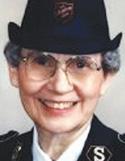
Commissioner Marjorie J. Hodder was promoted to Glory Feb. 20 from Sun City Centre, Florida.
Marjorie Fitton was born Dec. 18, 1932. She later married Kenneth L. Hodder and together they entered the School for Officers’ Training in the USA Western Territory as cadets in the Courageous Session. They were commissioned as Salvation Army officers May 26, 1958.
Following their commissioning, the Hodders served as corps officers, including appointments in California at Modesto Citadel, Fresno Citadel, Oakland Citadel and San Francisco Mission. They received the rank of captain in May 1961.
In June 1970, Marjorie was appointed to USA Western Territorial Headquarters, where she first served as Territorial Education Bureau Director and then as Assistant Property Secretary.
From June 1972 until June 1974, Marjorie served as Nurses’ Fellowship Secretary in Southern California. She then moved to the Northwest Division as Assistant Divisional Home League Secretary before being appointed to the School for Officer Training in Rancho Palos Verdes, California, on July 2, 1975, where she served for four years as Director of Spiritual Services.
From June 1979 until April 1985, Marjorie served as Divisional Director of Women’s Services and Home League Secretary, first in the Northwest Division and then in the Southern California Division. She received the rank of lieutenant colonel in August 1981.
The Hodders moved to the USA Central Territory in April 1985, with Marjorie appointed to the Territorial Women’s Department. Afterward, now as colonels, the Hodders transferred to the Australia Southern Territory, with Marjorie serving in the same capacity.
They returned to the USA as commissioners in 1989, with Marjorie’s appointment as Territorial President of Women’s Organizations, USA Southern Territory.
In August 1993, Marjorie transferred to the USA National Headquarters as National President of Women’s Organizations. The Hodders retired from active service Oct. 31, 1995.
The Hodders enjoyed many years in retirement in Sun City Center. Commissioner Kenneth L. Hodder was promoted to Glory May 1, 2023.
AURORA FROM PAGE 10
Commissioner Marjorie Hodder is survived by her son, Commissioner Kenneth G. Hodder (Jolene), daughter Major Katherine E. Hodder-Reed (John) and son S. Richard Hodder, and three grandchildren and seven great-grandchildren.
MAJOR BRIAN ANDERSON
July 3, 1947 – March 22, 2024
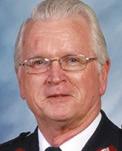
Major Brian Anderson was promoted to Glory March 22 from Nampa, Idaho.
Brian Edward Anderson was born
July 3, 1947, the third son of Harland and Edna Anderson of Grand Junction, Colorado.
In 1967, Brian joined the Air Force and served in Vietnam and the Philippines. After four years, he was honorably discharged and joined the National Guard in Colorado.
Brian continued his education, graduating from Metropolitan State College in Denver with a degree in Criminology. He also attended the Bomb Tech Training Center in Albuquerque, New Mexico. Upon returning to Grand Junction, he joined the Mesa County Sheriff’s Department, serving there over 16 years. On Easter Sunday 1981, he married Cindy King.
The Andersons became Salvation Army Auxiliary Captains in 1992. Their first appointment was to the Denver Harbor Light Center. A year later, they opened the Lambuth Family Center in Denver. From 1994-1998, they were In-Charge at the Denver Lighthouse; during this time they became Captains.
In 1998 they were transferred to the Phoenix Herberger Center and Corps Community Center. Five years later they became the Administrators for the Albuquerque Adult Rehabilitation Program. Their final ministry, from 2004 to 2013, was at the Farmington (New Mexico) Corps. While there, they started a summer day camp and Vacation Bible School sessions five days a week—a ministry to the 35-50 children of Navajo families who worked days and couldn’t afford daycare during the summer.
The Andersons retired in 2013, settling in Nampa, where they remained active volunteers with The Salvation Army. Brian Anderson rang the bell and counted the Christmas kettle proceeds for 42 years, from 1981-2022. He never stopped serving others.
Brian is survived by his wife, Major Cindy Lou Anderson; brothers: Gary, Loren and Kent Anderson; four nephews, three nieces and several cousins.
For high school junior Peyten Pack, learning to operate the front desk showed the value of order and attention to detail.
"I have learned the importance of organization and cleanliness," said Pack.
She said that working in an office setting helped her recognize the importance of structure and organization, differing from her tendency to be unorganized and misplace items in her everyday life.
"Through working with The Salvation Army, I have begun to realize the ease and efficiency that comes through proper organization," said Pack. "It was a good experience because it taught me organization, customer service and the value of set systems."
For Pack, the most memorable aspect of the internship was connecting with clients.
A celebration of life took place April 24 at the Caldwell (Idaho) Corps.
MAJOR CARLA HOGAN
May 30, 1947 – March 24, 2024

Major Carla Hogan was promoted to Glory March 24 from Lakewood, Colorado. Carla was born
May 30, 1947, in Tacoma, Washington, to Carl and Shirley Baldwin. While still a young child, her mother died, and several families cared for her until, at age 7, Carla was adopted by James and Rose Marie Haines in Aberdeen, Washington. Surrounded by music in her home, she learned to play cello and piano, and she had a lovely singing voice.
In high school, she was invited to a Salvation Army youth meeting where she met Neal Hogan. They became high school sweethearts. Each heard the call to follow Christ as officers of The Salvation Army. They were married September 7, 1968, and they entered The Salvation Army Western Territory School for Officers’ Training in San Francisco the following year. They were commissioned in 1971 with the Victorious Session.
The Hogans served as corps officers in four California corps: San Francisco Oceanview, Anaheim, Redondo Beach and Bakersfield. They were then appointed to social service appointments in California (Oakland Clay Street), Oregon (Portland Harbor Light), and Colorado (Denver Harbor Light), giving Carla the opportunity to lead special services that took her beyond her appointment, including holding workshops on AIDS awareness and sexual safety, outreach, coalition development, human trafficking and support for trafficked individuals.
Throughout her life, Carla sought to serve others on a personal, meaningful level. She was particularly concerned about serving seniors, so she pursued the field of gerontology to be more effective in her ministry. She built strong Home Leagues in corps appointments, helping the women develop their own spiritual gifts. She empowered volunteers and participants in her social ministry training sessions so they could be of service to others.
Carla felt her greatest achievement was raising her children to be faithful Christians.
She is survived by her husband, Major Neal Hogan; son, Errin Hogan; daughter, Cari Nimeth (Matthew); and eight grandchildren. The immediate family will gather for a private celebration of life at a later date. NFC
"I really liked getting to talk to people," she said.
She said connecting with the public offered valuable insights into effective and compassionate communication, leading to advancements in her interpersonal skills.
When a man and his daughter approached the front desk, Pack noticed they were hard of hearing and communicated with American Sign Language (ASL) to greet them and introduce herself.
"She was happy that I was reaching out in a way familiar to her," Pack said. "Reaching out to others in a way that allows them to connect with you can help them realize that you are there with them."
Pack said working alongside her peers to problem solve and complete a goal left her encouraged and passionate about the work—something research published in the National Library of Medicine supports.
A study by Jinho Kim and Kerem Morgül of the University of Wisconsin-Madison found that involving youth in volunteering can enhance factors such as self-es-


teem, which can help manage negative emotions like depression, anxiety and stress. Additionally, researchers reported volunteering can promote social connections by decreasing feelings of isolation and increasing peer support.
“It is such fulfilling work,” Pack said. “I never went home feeling less about myself for doing so. I have never talked to someone who regretted volunteering their time, but I have met many who say they regret not getting involved in their community through volunteer work.”
Esquivel said he also experienced growth over the course of the program in the interns’ customer service skills, organizational strategies and culinary abilities.
He said some interns also develop a newfound appreciation for volunteer work and choose to return to the corps after graduation, recalling one student who returned during a college break to give back.
"It's great to provide these long-term benefits as we prepare them for the real world," Esquivel said. NFC
NEW FRONTIER CHRONICLE • MAY/JUNE 2024 13 TERRITORIAL HEADQUARTERS PERSONNEL SERVICES Lt. Colonel Ivan P. Wild Territorial Secretary for Personnel–Designate —Effective July 1 Territorial Secretary for Personnel —Effective Oct. 1 Lt. Colonel Jennifer Wild Territorial Assistant Secretary for Personnel–Designate —Effective July 1 Territorial Assistant Secretary for Personnel —Effective Oct. 1 SOUTHWEST DIVISION Major Charles S. Fowler Divisional Commander —Effective July 1 Major Shari Fowler Divisional Director of Women’s Ministries and Divisional Secretary for Program* —Effective July 1 NORTHWEST DIVISION Captain Felicia E. Grant Divisional Program Officer —Effective March 6
AND BERMUDA TERRITORY Colonel Lani Chamness Territorial Secretary for Spiritual Life Development —Effective March 6 *Indicates additional responsibility NEW APPOINTMENTS
CANADA

Salvation Army participates in mock disaster exercise
As part of the 2024 Alaskex mock earthquake/tsunami exercise in Cordova, Alaska Divisional Emergency/Disaster Services Director Jenni Ragland worked with the city, local volunteers and the National Guard to pack and deliver emergency food boxes to 40 households. Senior disaster kits were also offered to residents residing in the Sunset View apartment complex. The efforts simulated coordination that would take place during a true emergency.
CASCADE

High school student helps Medford Hope House
Nathan Snyder, a high school student in Medford, Oregon, helped The Salvation Army Hope House create its new wellness and recreation center, which opened in March. Along with raising funds, Snyder recruited several school friends to help construct three sheds to store Hope House supplies, thus clearing space onsite for the recreation center. He also advocated for the project in the community, raising more than $17,000 in cash and in-kind donations. The 2023 Emerging Leaders program recognized Snyder for his efforts and Oregon House of Representatives member Christine Goodwin presented him with a State Letter of Commendation.
Majors Jonnette and Randy Mulch are Medford Corps Officers and Jackson County Coordinators.
DEL ORO
Napa Corps honors advisory board members
The Salvation Army Napa (California) Corps honored Advisory Board members Jim Jones and Walt Spicer with the Advisory Board Life Member designation.
Spicer, 94, served as an Advisory Board Member for 32 years. Throughout his tenure, he supported Emergency/Disaster Services, serving community members impacted by Hurricane Katrina and helping the corps purchase a back-up generator and a new canteen.
Jones, 84, has supported the corps with his legal expertise, assisting a wide range of initiatives, including the establishment of its culinary academy, and creation of additional housing for academy students and graduates.
Captain Larry Carmichael is the Napa Corps Officer.
GOLDEN STATE
Joseph McFee Center ready for workouts
The Joseph McFee Center in San Francisco renovated and reopened its gym, thanks to The Marker Hotel, which donated gym equipment, and three advisory board members—Betsy Strong, Fifi Holbrook and Dick Clark—who provided funds for a new gym floor.
Aaron Lowers, Director of Extended Recovery, coordinated the repairs, including painting, electrical upgrades, flooring installation and delivery of the equipment. Previously, the gym—now called The Marker Gym—had not been usable. Lowers said the response has been “overwhelmingly positive” from participants in the recovery-focused transitional housing program.
HAWAIIAN AND PACIFIC ISLANDS

New trailer to support responses on Big Island
The Salvation Army Hilo Corps unveiled the new Malama 'Ohana Kitchen that will support its Emergency/Disaster Services responses and help reach individuals experiencing homelessness with hot meals. The 32-foot long trailer is equipped with a commercial kitchen and smoker, and can serve approximately 2,500 meals a day.
“The Malama ‘Ohana Kitchen is more than just a mobile kitchen; it symbolizes The Salvation Army’s ongoing commitment to serving the community,” said Captain Samuel LeMar, Hilo Temple Corps Officer and Hawaii County Coordinator. “This trailer is our way of reaching out to the people of Hawaii County in times of need, whether it's by providing them with a warm meal or responding to emergencies.”
INTERMOUNTAIN

Division launches Music and Arts Day
The Intermountain Division held its inaugural Music and Arts Day Feb. 24 at the Denver Centennial Corps, inviting 65 participants to engage in band, chorus or drama activities. The monthly event will rotate between the Denver Centennial and Denver Citadel corps. “It's an opportunity for people to join together and for us to encourage music and creative arts," said Divisional Music Director Stephen Yalden.
NORTHWEST

Kroc Center hosts mental health seminar
The Interact Club convened at the Coeur d’Alene (Idaho) Kroc Center for an event focused on Coping with Creativity Feb. 15. The club, affiliated with Rotary, was hosted by Tyson Durbin, a licensed therapist at the Kroc Center, and aimed to bring together teens and their parents for a mental health session. Attendees explored healthy coping strategies and learned about ways to support loved ones facing mental health challenges. Following the seminar, participants gathered for a painting session to express their emotions through art. Majors Don and Ronda Gilger are the Coeur d'Alene Kroc Center Corps Officers.
SOUTHERN CALIFORNIA
Long Beach hosts Red Shield Day
The Salvation Army Long Beach (California) Red Shield held its annual Red Shield Day March 23. The free event unites the community through carnival games, music, face painting, sports games and food.

Corps Officer Captain Jared Arnold credits the event's success to volunteers and the community's support as well as sponsors from local organizations such as the Long Beach Police and Fire departments, Memorial Care, Long Beach Utilities and the Port of Long Beach.
SOUTHWEST
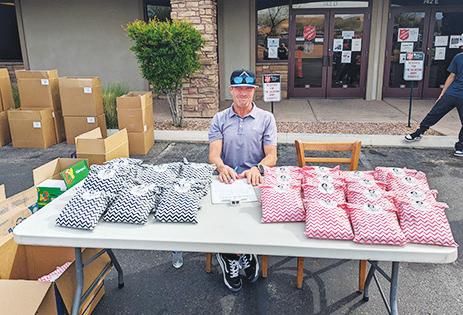
Service Center partners to end period poverty
The Salvation Army Mesquite (Nevada) Service Center began a new ongoing partnership with nonprofit Project Marilyn to provide feminine hygiene products to people in need March 29.
The collaboration served 50 individuals in less than one hour on its first day and will continue to provide hygiene packages at monthly distribution events. Each Project Marilyn package includes enough wipes and supplies to last for one cycle, ensuring adequate and safe feminine care for those who may not be able to afford the extra expense.
Anthony Rivera is the Mesquite Service Center Coordinator.
ARCC
Celebrating recovery at the 2024 Men’s Conference
On March 2, The Salvation Army San Bernardino and Perris Adult Rehabilitation Centers (ARCs) convened at the Riverside (California) Corps for the annual Men’s Conference. The event gathered 120 men for worship and fellowship, celebrating their recovery journeys and triumph over alcohol and substance dependency. "They were truly blessed by this opportunity and haven't stopped talking about it since," said Captain Jennifer Butler, Riverside ARC Administrator for Program.
CFOT

2024 Spring Campaigns
For Spring Campaigns, the Saved to Serve brigade, comprising second-year cadets and CFOT faculty, traveled to the Kenya East Territory, where they participated in ministry alongside Kenyan cadets. The Whosoever brigade traveled to the Hawaiian and Pacific Islands Division to serve on Oahu, Maui and the Big Island, while the Five Disciples brigade ministered at the Northwest Divisional Youth Retreat and at corps in Puyallup, Olympia and Spokane, Washington. The Faithful One brigade served in Southern California at the Long Beach Red Shield and the Torrance Corps.
Major Terry Masango is CFOT Training Principal. NFC
14 NEW FRONTIER CHRONICLE • MAY/JUNE 2024 AROUND THE WEST ALASKA
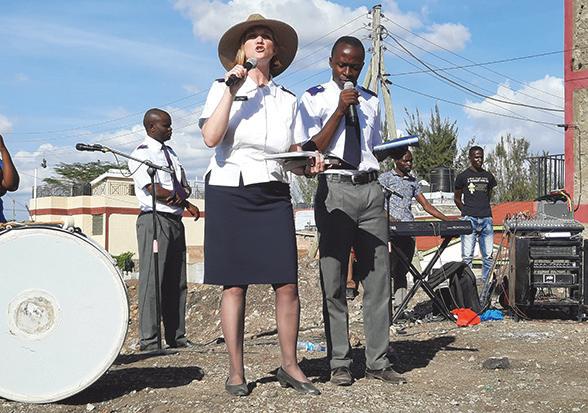

WHAT IS NATIONAL

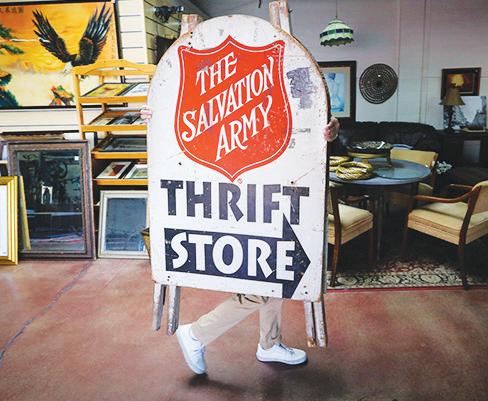
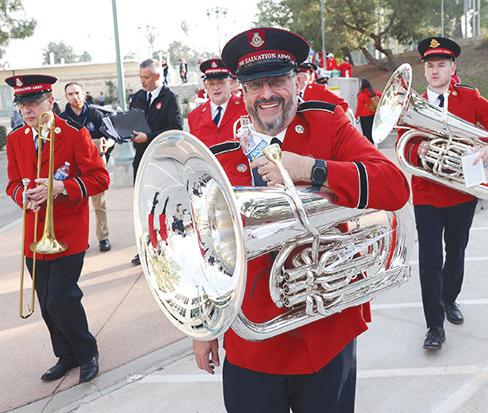
SALVATION ARMY WEEK?


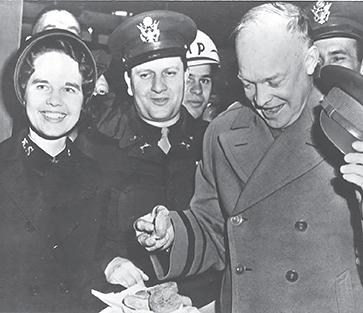
National Salvation Army Week is a celebration steeped in nostalgia, but it is also an opportunity to highlight The Salvation Army’s relevance in the United States today, and thank all who work to make it possible.
President Dwight D. Eisenhower first proclaimed the week in 1954, a mere 74 years after The Salvation Army arrived in the U.S.
Last year’s Salvation Army impact in the U.S.:
Provided emergency shelter and transitional housing for 7,779,900 people.
Provided more than 171 million meals through food boxes and hot meals.
Provided rent and utility assistance to 3,870,131 families in need.
GIVING FREELY OF THEMSELVES, THE MEN AND WOMEN OF THE SALVATION ARMY HAVE WON THE RESPECT OF US ALL.
—President Dwight D. Eisenhower “
In his speech acknowledging National Salvation Army Week, Eisenhower noted: “Among Americans, The Salvation Army has long been a symbol of wholehearted dedication to the cause of human brotherhood. In time of war, the men and women of this organization have brought to those serving their country far from home, friendliness and warm concern. In the quieter days of peace, their work has been a constant reminder to us all that each of us is neighbor and kin to all Americans. Giving freely of themselves, the men and women of The Salvation Army have won the respect of us all.”
So when is it?
This year, National Salvation Army Week is May 13-19.
Like Easter, Thanksgiving or even National Doughnut Day, National Salvation Army Week happens in the same month every year, but on different dates. The “formula”: National Salvation Army Week begins the Monday after Mother's Day—always the second Sunday of May—and runs through the following Sunday. NFC
SEE MORE about the impact of The Salvation Army and how you can help Love Beyond today at caringmagazine.org.
5 ideas for ways to observe National Salvation Army Week this year:
Engage with elected officials to share the good work of the Army being done in and for their community
• Invite media and donors for tours of the corps or programs
Hold an open house
Share Salvation Army history on social media
Hold a volunteer appreciation celebration
NEW FRONTIER CHRONICLE • MAY/JUNE 2024 15 KNOW YOUR ARMY
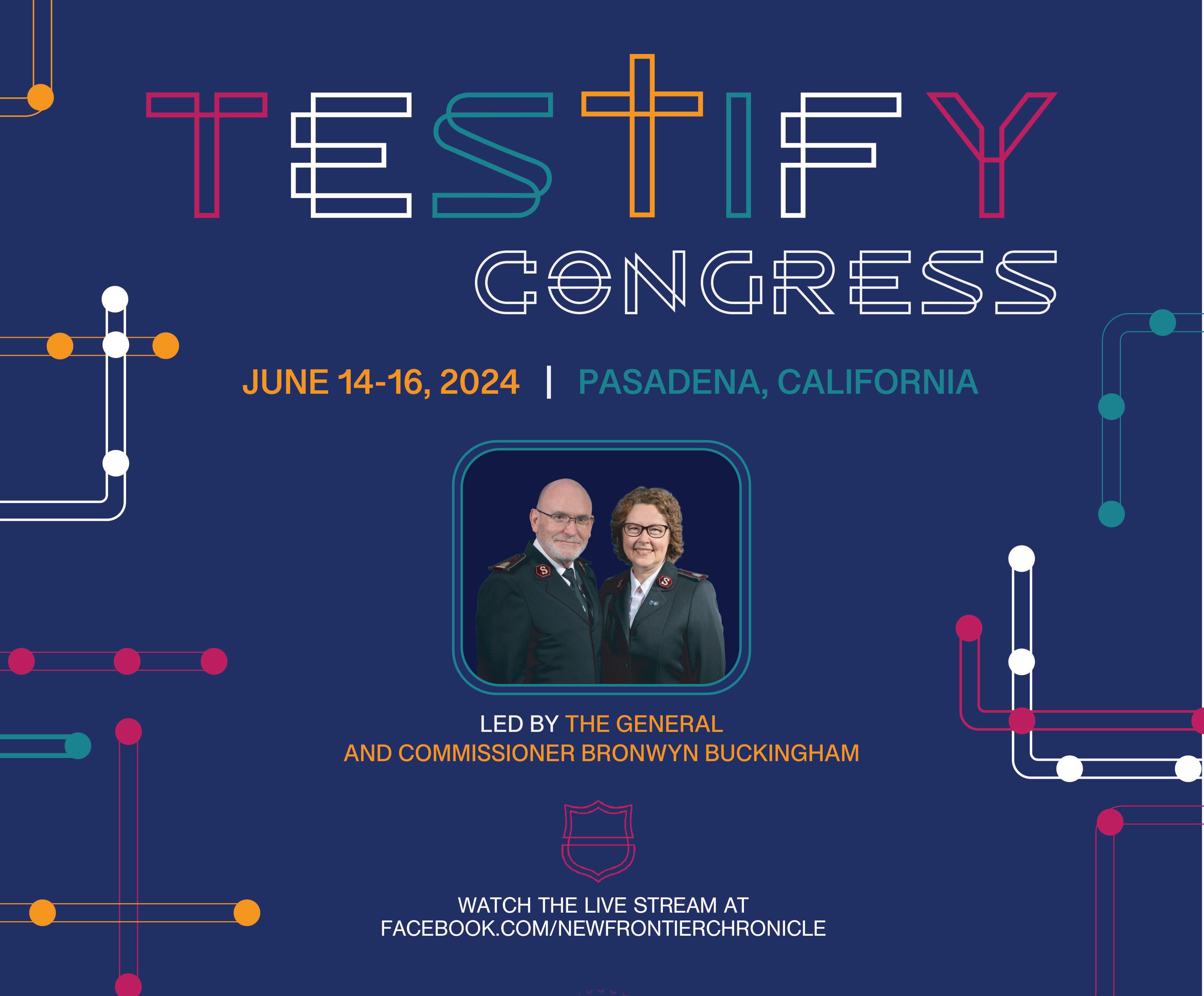


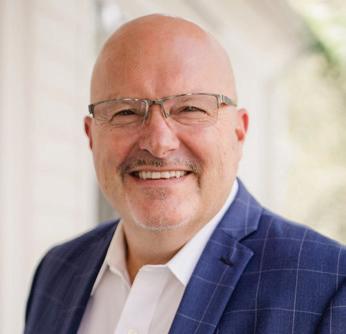



16 NEW FRONTIER CHRONICLE • MAY/JUNE 2024 CONGRESS seminar speakers and Artists FRIDAY & SATURDAY Jeniffer lives in Nashville, TN with her husband, Nate, and their two children. She has a B.A. from Taylor University in Premedical Biology with a minor in Theater Performance Arts. Though now fully committed to her speaking ministry, her past is filled with weird and wonderful adventures. Jeniffer proudly speaks to audiences across the country about her passion for living life in the fullness of Christ. Lifestyle evangelism is not only her most passionate speaking topic, but also her manner of living. It encompasses everything the body of Christ desires to impart to people today –to live in such a way that those around you will be eternally impacted for the kingdom of God. JENIFFER DAKE BALANCE IN MINISTRY Bill and Diane Ury have been married since 1984 and have enjoyed a life of ministry together. After over two decades of serving The Salvation Army, in 2017 they joined National Headquarters and accepted the role of National Ambassadors of Holiness. Both Bill and Diane are ordained Elders in the Evangelical Methodist Church, have pastored together, and have spent decades discipling men and women. They are fully committed to the historic basis and contemporary expressions of consensual orthodox Christianity and the Wesleyan Holiness tradition. Their personal desire is to incorporate sound, rigorous Christian theological thinking with pastoral care, spiritual formation, and true compassion. DR. BILL AND DIANE URY HOLINESS Chuck Davis has served in vocational ministry for over 35 years. He has served as a small church pastor in the U.S. and France, missionary church planter, evangelist and Field Director in Mali, and seminary professor. He has a special interest in training church leaders to exegete culture for evangelism and mission, and empowering leaders in spiritual warfare for the advancement of the kingdom of God. With his multiple ministry contexts – small and large church, field missionary and mission director, seminary professor – and with his multi-cultural and diverse socio-economic experiencesChuck brings a wealth of practical experience and understanding to growing leaders and ministry settings. CHUCK DAVIS TEACHING FROM THE BOOK OF ACTS (GO AND PREACH!) Ingrid Davis is a gifted speaker, leader, teacher, mentor, and certified leadership coach. Ingrid has a bachelor’s degree in education, a master’s degree in Intercultural studies, and a doctorate in Global Leadership from Alliance Theological Seminary. Ingrid has been involved in leadership development for over 30 years. She specializes in leadership coaching, soul care, and character-based leadership development. Her passion is to grow and develop leaders to transform lives and communities. INGRID DAVIS CARE FOR MY SOUL (WHILE BUSY IN MINISTRY) Commissioners Brad and Heidi Bailey love the Lord, love people and loved being active Salvation Army officers for 86 years of combined service! They have served the Lord in the United States, South America, Spain and England, and are presently enjoying retirement in Atlanta, Georgia! Brad and Heidi have been blessed with two beautiful daughters, Danielle (married to Jeremy Rowland) and Lindsey, who share in their global perspective, love of Spanish and Kingdom living. Their two grandsons, Micah and Eli, keep them young at heart, good friends keep them grounded, the good Lord keeps them grateful, and good coffee keeps them going! COMMISSIONERS BRAD & HEIDI BAILEY MULTICULTURAL MINISTRY QUICK TIPS & LATINO RALLY SPEAKER On the poverty-stricken East London streets of Victorian England two armies line up for battle. The Skeletons fight for the comforts of the present. The Salvationists fight for the hope of tomorrow. Caught in the middle, Charles Jeffries, a charismatic young leader of the Skeleton Army must decide what side he really is on. A unique two person musical presented by Kathryn and Kyle Higgins. The musical is presented three times: Friday Afternoon, Saturday Morning and Saturday Afternoon. THE SKELETON ARMY A MUSICAL CONGRESS Teach, Train and Motivate Salvationists to tell the Story of Jesus more often, and to more people, through words and actions. Always be prepared to give an answer to everyone who asks you to give the reason for the hope that you have.” (1 Peter 3:15) THURSDAY JUNE 13 9:00 AM Active Officers’ Seminars 10:30 AM Retired Officers’ Reception with The General 12:00 PM Lunch – Officers with The General* 1:30 PM Territorial Officers’ Councils with The General – Session 1* 3:00 PM Break 3:30 PM Territorial Officers’ Councils with The General – Session 2* 3:30 PM Officers’ Kids’ Event 5:30 PM Dinner – Officers and Family with The General 7:30 PM Pre-Congress Concert - presented by the Staff Band and Staff Songsters FRIDAY JUNE 14 9:00 AM Seminars / Workshops* 10:00 AM COMMENCEMENT* 12:00 PM Silver Star Banquet** 1:30 PM Seminars / Workshops 3:00 PM Recovery Event 3:00 PM Skeleton Army The Musical 4:30 PM Long Service Dinner** 5:00 PM Congress Dinner 7:00 PM MAIN SESSION - TESTIFY - SUMMONED!* 9:00 PM Evening Fellowship / Refreshments SATURDAY JUNE 15 8:30 AM Seminars / Workshops 8:30 AM Encore 10:00 AM Skeleton Army The Musical 11:30 PM Congress Lunch - Kids’ Rally Men’s Rally Women’s Rally [childcare provided 0-5yrs 2:00 PM Encore 2:30 PM Seminars / Workshops 3:00 PM Skeleton Army The Musical 3:30 PM Bible Bowl 3:30 PM Latino Rally 3:30 PM Fellowship / Concerts 5:00 PM Congress Dinner 7:00 PM MAIN SESSION - TESTIFY - CELEBRATE OUR STORIES! 9:00 PM Young Adult Event 9:00 PM Evening Fellowship / Refreshments SUNDAY JUNE 16 8:00 AM Congress Breakfast 10:00 AM MAIN SESSION - TESTIFY - HOLY LIVING! 12:30 PM Congress Lunch / Concerts 3:00 PM MAIN SESSION - TESTIFY - TELL THE WORLD!* 5:00 PM Congress Concludes * Childcare Provided ** By invitation only























































